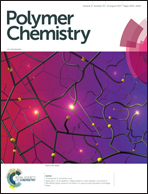Thermoresponsive laterally-branched polythiophene phenylene derivative as water-soluble temperature sensor†
Abstract
Polymers with thermoresponsive properties have received a strong interest due to their potential applications. Here we report the synthesis and characterisation of a water soluble and thermoresponsive polythiophene derivative. Firstly, a polythiophene phenylene (PThP) functionalised with an initiator for atom transfer radical polymerization (ATRP) and azide groups on the side chains was synthesised. Secondly, ATRP was employed to graft poly(ethylene glycol) methacrylate (PEGMA) from the PThP to create a permanently water soluble conjugated polymer. Further functionalisation was then conducted through the ‘click’ reaction with propargyl functionalised poly(2-n-propyl-2-oxazoline) to introduce thermoresponsivness. The polymer displayed lower critical solution temperature (LCST) behavior, as revealed by fluorescence and UV-Vis spectroscopy with potential use as soluble polymeric thermometer.



 Please wait while we load your content...
Please wait while we load your content...